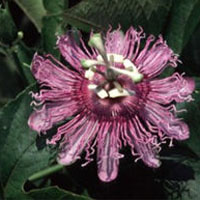Penn Herb Wellness Guide
Passion FlowerFind Products
 © Steven Foster
© Steven FosterHow It Works
For many years, plant researchers believed that a group of harman alkaloids were the active constituents in passion flower. Recent studies, however, have pointed to the flavonoids in passion flower as the primary constituents responsible for its relaxing and anti-anxiety effects.3 European herbal pharmacopoeias typically recommend passion flower products containing no less than 0.8% total flavonoids. The European literature involving passion flower recommends it primarily for the treatment of mild to moderate anxiety. In this context, it is often combined with valerian, lemon balm, and other herbs with sedative properties.
How to Use It
The recommended intake of the dried herb is 48 grams per day.4 To make a tea, 0.5 to 2.5 grams of the herb can be steeped with boiling water for ten to fifteen minutes and drunk two to three times per day. Alternatively, 510 ml of passion flower tincture can be taken three to four times per day.
Copyright 2026 TraceGains, Inc. All rights reserved.
Learn more about TraceGains, the company.
The information presented by TraceGains is for informational purposes only. It is based on scientific studies (human, animal, or in vitro), clinical experience, or traditional usage as cited in each article. The results reported may not necessarily occur in all individuals. Self-treatment is not recommended for life-threatening conditions that require medical treatment under a doctor's care. For many of the conditions discussed, treatment with prescription or over the counter medication is also available. Consult your doctor, practitioner, and/or pharmacist for any health problem and before using any supplements or before making any changes in prescribed medications. Information expires December 2026.


